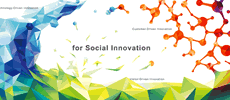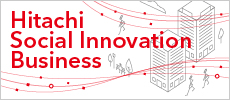AbstractResearch & Development
Evolution of Global Co-creation
Researchers from Hitachi’s Research & Development Group go out to engage with customers around the world, working with them on the co-creation of innovations that address the issues they face. These co-creation activities include providing customers with the latest technologies and involve gaining an in-depth understanding of their businesses and users in order to solve these issues. Moreover, with COVID-19 having made such face-to-face engagement more difficult over the past few years, Hitachi is also making greater use of digital technologies to transform how it goes about co-creation.
Two recent trends have been a greater focus by customers on environmental issues such as carbon neutrality and an acceleration in the DX of business driven by rapidly evolving technology. This section describes co-creation initiatives being undertaken by Hitachi and the results that have been achieved, looking in particular at work on DX in North America and on addressing environmental problems in Europe.
Value-based Innovation
To ensure that people everywhere can live in a world that offers a comfortable, secure, and healthy way of life, Hitachi engages in the research and development of technologies that help build sustainable societies, enhance QoL, and boost corporate value for customers. In doing so, it is seeking to underpin the next generation of growth businesses by addressing the increasingly complex societal challenges that confront the modern world, taking its inspiration from common values that encompass the environment, resilience, and safety and security, and creating innovative products and services that combine these products with digital technologies.
This section describes the work that Hitachi is doing to help societies decarbonize, to enhance the ability of societies and companies to adapt to environmental change, and to enhance people’s QoL while coping with aging demographics.
Lumada Ecosystem
Research and development of Lumada is directed at achieving social innovation by identifying the indicators of change contained in data and working with customers to create new value. This involves working on Lumada cyber physical systems, mission-critical IoT platforms that provide total solutions ranging from DX applications to products that use digital technology for optimizing social infrastructure, using these to deliver value for the environment, resilience, and safety and security.
Through the analysis in cyberspace of the many different forms of data collected from physical space (social infrastructure) so that the results can provide real-time feedback to these real-world applications, Hitachi is able to supply digital solutions that leverage its strengths in OT, IT, and products. This section describes the core Lumada technologies of AI, Beyond 5G/6G, data management, and AR/VR that are leading the way to further global growth.
Exploratory Research
Research and development at Hitachi takes a strategic approach to selecting which issues to address, backcasting from scenarios of society in 2050 to anticipate future societal challenges from a global perspective and to identify business opportunities. Hitachi is working with world-leading partners such as University of Cambridge on the development of disruptive technologies that include the upcoming societal challenges of carbon neutrality that will begin to emerge from around 2030, technologies for hydrogen and artificial photosynthesis for the restoration of the climate and ecosystems, regenerative medicine and cell therapy for enabling healthcare to deliver a high QoL in an era of 100-year lifespans where the threat of cancer has been overcome, and quantum computing that acts as a driving force behind a post-singularity digital society.
To ensure that these technologies gain public acceptance, Hitachi has also established joint laboratories with the University of Tokyo, Kyoto University, and Hokkaido University, working with the universities and with partners from the government, general public, and corporate sectors who come together at these laboratories to put forward policies and visions and to run community-based trials.



